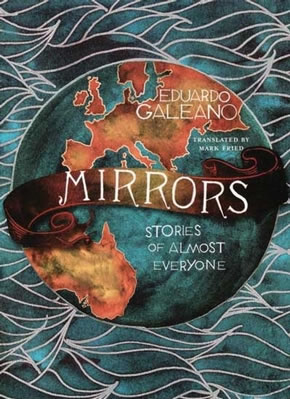 Mirrors: Stories of Almost Everyone
Mirrors: Stories of Almost Everyone
When Hugo Chávez presented Barack Obama with a copy of Open Veins of Latin America at the Summit of the Americas last year, he turned its author, one of the continent’s best-kept secrets, into an international bestseller. And not before time.
Overshadowed by the more celebrated writers of “El Boom Latino-Americano”, Eduardo Galeano has always been an acquired taste for readers in the English-speaking world. At once lyrical and highly political, the Uruguayan has always been difficult to pigeonhole. In the preface to Memory of Fire (1982-86), his mesmerizing three-volume narrative history of the Americas in vignette form – and the one on which his reputation is likely to rest – Galeano sets out his stall: “I don’t know to what literary form this voice of voices belongs... I don’t know if it is a novel or essay or epic poem or testament or chronicle… I do not believe in the frontiers that, according to literature’s customs officers, separate the forms.”
Rendered in 600 succinct and elegant entries, Mirrors imitates the trilogy both in tone and structure. Originally subtitled A History of the World, Refracted, Mirrors is by no means exhaustive, nor overly concise. It is much more than that: it is Galeano’s rediscovery of human history from the perspectives of “The invisible” and “The forgotten”, from those that have no voice. Moreover, it is an attempt to rescue history’s victims and reclaim these stories from what he terms a “collective amnesia”.
From the birth of desire (“Life was alone, no name, no memory. It had hands, but no one to touch. It had a tongue, but no one to talk to”) and Adam and Eve (“The human adventure in the world began in Africa”), Galeano guides the reader into the 21st century (“The twentieth century, which was born proclaiming peace and justice, died bathed in blood”). While Galeano may flit from continent to continent, and from century to century, there is cohesion and rhythm to the book despite the stark juxtaposition of these stories. Haitianismo and a potted biography of Toussaint L’Ouverture follow Büchner’s death; Colombian goalkeeper René Higuita’s scorpion kick at Wembley heralds Brecht slipping a poem past the East German censors in 1953; Rosa Luxemburg anticipates Churchill drawing up a new map of the Middle East.
With Galeano less is always more: the vignettes allow the crystallisation of these histories – some forgotten, others familiar – with an economy that is impressive. Nevertheless, it is the dark cracks between the fragments that dazzle, the unsaid that clamours to be heard.
And yet Mirrors is not Galeano at his best. At times the material – by turns indignant, humorous and sad – has the texture of offcuts hewn from Memory of Fire. He is more surefooted when unmasking the secret history of the Americas – especially that of Uruguay and Uruguayan “exceptionalism” – than, say, Europe. (He mistakenly attributes the establishment of the concentration camp to the British rather than Valeriano Weyler in Cuba.)
“For half a century, Uruguay has not won a single world soccer championship, but during the military dictatorship the country won other titles: relative to its population, it had the most political prisoners and the most victims of torture.
‘Libertad’ [‘Liberty’] was the name of the biggest jail. Perhaps inspired by the name, imprisoned words sometimes broke out. Through the bars slid poems written on tiny cigarette papers.”
Detractors of Galeano have often sought to portray him as simplistic and reductive, a parody of the Latin American anti-imperialist anti-yanqui. Yet this is to do him a disservice. Whilst he may at times be prone to self-righteousness and bombast, he shares with George Orwell the very best of traits: an intellectual honesty and a belief in human values, not to mention a clear writing style. That is why Eduardo Galeano matters.

